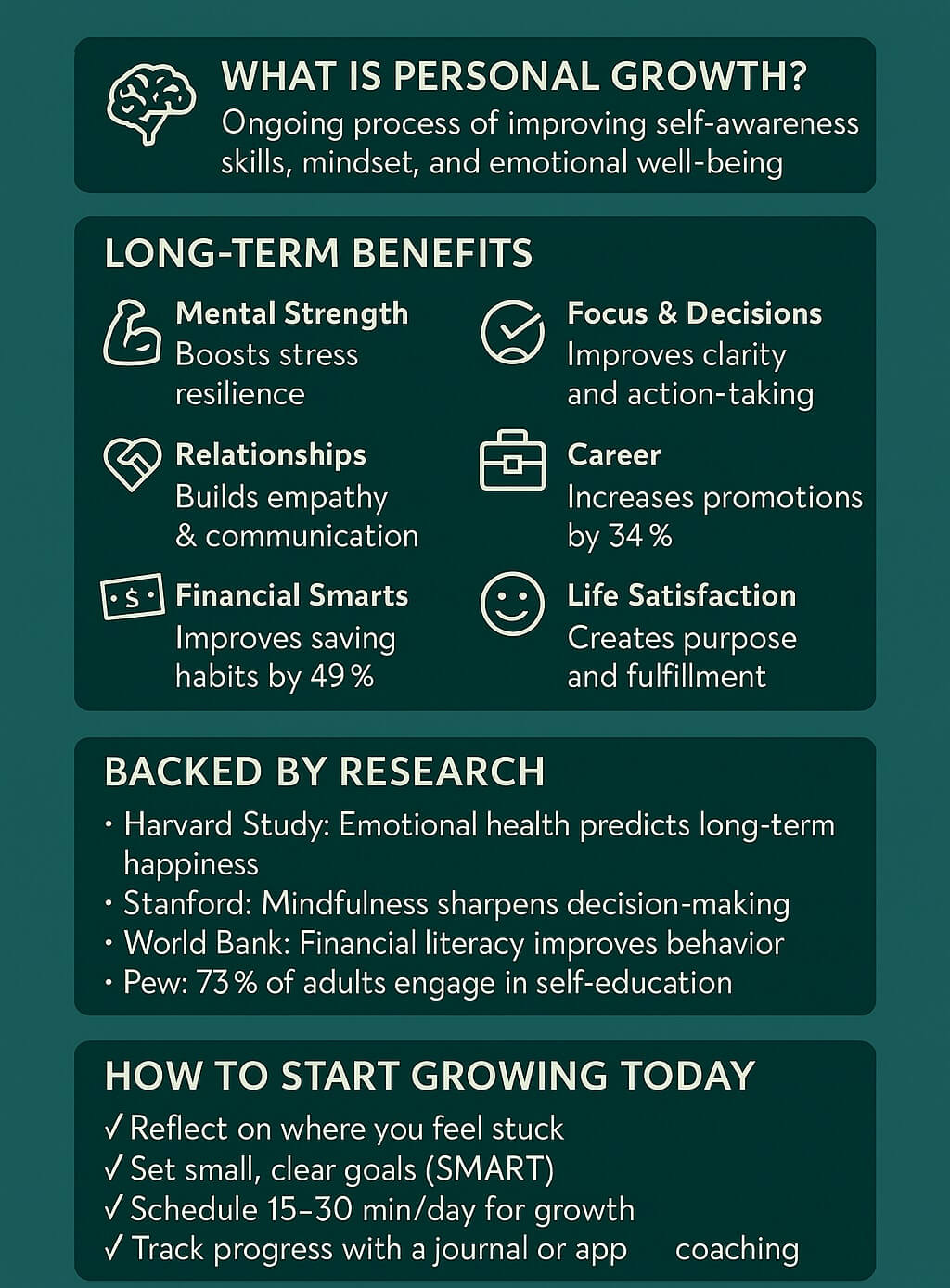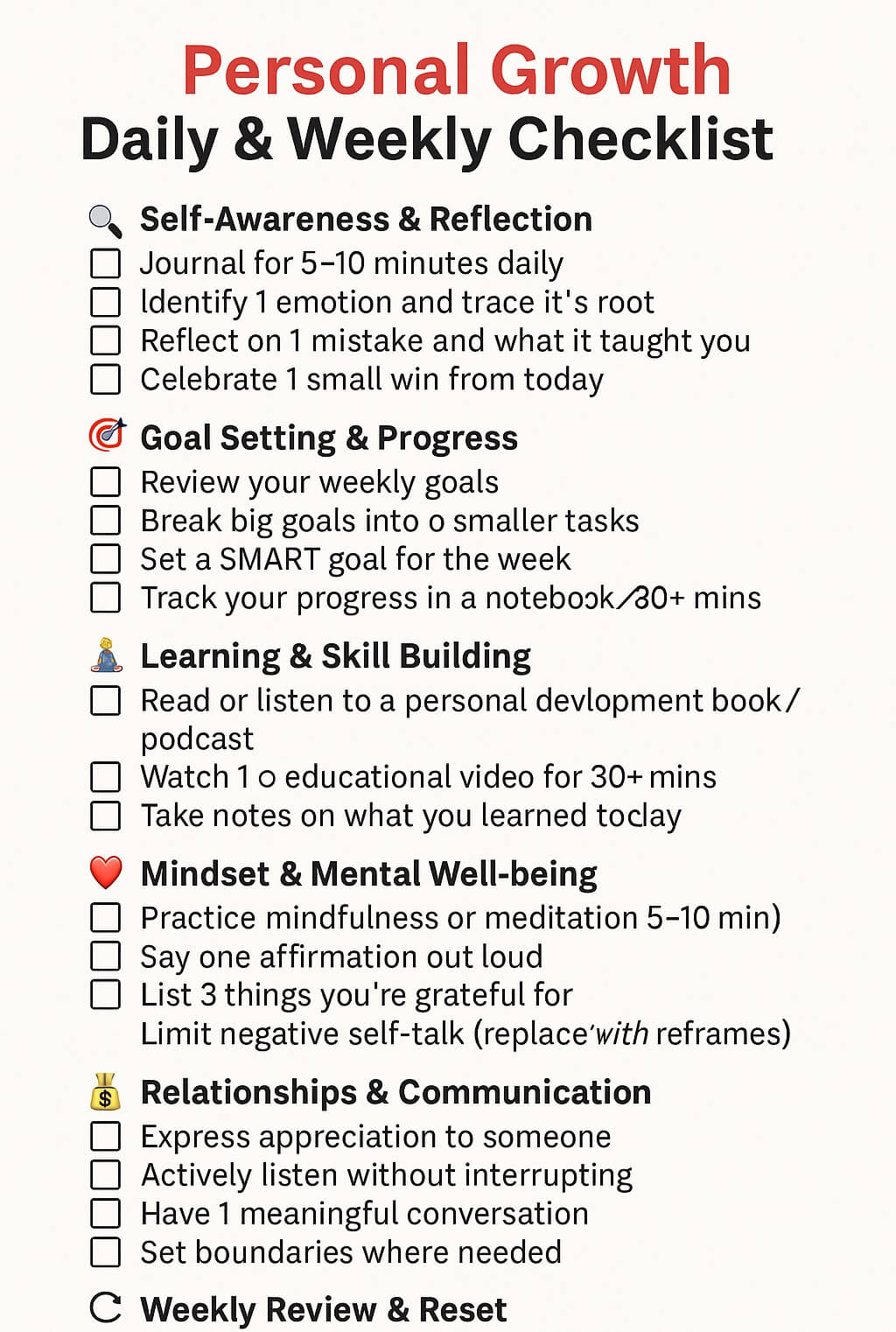
Ever feel like you're stuck in a loop—doing the same things, feeling the same way, yet craving something more meaningful? That quiet urge is often your inner self asking for growth. Personal growth isn’t a buzzword. It’s a long-term commitment to becoming more confident, aware, skilled, and fulfilled.
You’ll walk away with a clear view of personal growth, why it’s one of the smartest investments you can make, and how it pays off across every area of life—from your mindset to your relationships, finances, and career.
We’ll explore personal growth and why it matters, share real-life examples, offer research-based insights, and guide you through how to start investing in yourself today—and keep doing it for life.
Table of Content
- What Is Personal Growth?
- Lifelong Benefits of Investing in Yourself
- Real-Life Stories That Prove It Works
- What the Research Says About Personal Growth
- What Personal Growth Looks Like in Everyday Life
- Obstacles That Might Slow You Down
- How to Start Growing—One Step at a Time
- What You Get from Personal Development Over Time
- Why Your Mindset Matters So Much
- Top Resources to Support Your Growth
- Why Personal Growth Is Always Relevant
- Final Thoughts
- FAQs
What Is Personal Growth?
Personal growth is a continuous process of developing your emotional, mental, and behavioral patterns to improve your quality of life. It’s about recognizing that you can evolve through intentional actions.
Core Elements of Personal Development
-
Emotional awareness and regulation
-
Building discipline and habits
-
Developing self-confidence
-
Expanding skill sets
-
Enhancing relationships and communication

Lifelong Benefits of Investing in Yourself
Emotional Resilience and Mental Strength
People who work on their inner well-being become more stable in the face of stress. A 2021 study published in the Journal of Clinical Psychology found that individuals focused on self-development reported 40% lower stress levels and better coping mechanisms.
Improved Decision-Making and Focus
When you're tuned in to your goals and values, making choices becomes clearer. According to neuroscience research from Stanford, daily reflection—such as journaling or practicing mindfulness—improves focus and problem-solving.
Healthier Relationships
Strong personal values and communication skills can help you build more honest relationships. The Harvard Study of Adult Development, a 75-year research project, revealed that strong social ties are linked to better health and happiness.
Career Growth and Fulfillment
Investing in personal growth doesn’t just make you feel better—it shows up in your work. The LinkedIn Learning Report (2023) found that people who consistently worked on self-improvement were 34% more likely to earn promotions or shift into more fulfilling roles.
Financial Intelligence
Part of growing personally includes becoming smarter with money. The World Bank reported that financial literacy training improved savings behavior by nearly 50%. When you grow your money mindset, you make smarter decisions that support long-term goals.
Life Satisfaction and Purpose
Living a meaningful life starts with clarity. People who reflect, set goals, and act intentionally are likelier to feel a sense of direction. A report from The Journal of Positive Psychology indicated that those engaged in self-development routines were significantly more satisfied with their lives.
Real-Life Stories That Prove It Works
Oprah Winfrey often discusses how journaling, self-reflection, and reading shaped her personal and professional life. Naval Ravikant, a tech entrepreneur, credits his peace of mind and business success to practices like reading, solitude, and meditation. These aren’t isolated cases—they're examples of how investing in yourself builds long-term returns.
What the Research Says About Personal Growth
-
Harvard Business Review found that employees who pursue continuous learning outperform their peers in adapting to change and taking initiative.
-
A Pew Research Center report stated that 73% of adults now participate in self-initiated learning activities.
-
Stanford University data shows that mindfulness practices increase emotional regulation and flexibility.
What Personal Growth Looks Like in Everyday Life
Self-Education and Reading
Reading for 10–15 minutes daily can dramatically change your thinking. Books like "Atomic Habits" by James Clear or "Mindset" by Carol Dweck aren’t just popular—they offer actionable frameworks for real change.
Skill Building
Learning something new—public speaking, coding, or cooking—builds confidence. Improving your abilities allows you to gain more control over your outcomes.
Coaching and Mentorship
Having someone to provide feedback and direction helps you stay on track. Many successful professionals credit their growth to having a mentor or coach.
Emotional Intelligence Training
Empathy, listening, and emotional control improve personal and professional relationships. Free resources and workshops are available online to help people develop these skills.
Obstacles That Might Slow You Down
Internal Barriers
-
Fear of failure
-
Low self-worth
-
Belief that change is impossible
These internal blocks often stop people before they start. But they can be reprogrammed through consistent effort and mindset work.
External Challenges
-
Time constraints
-
Financial limitations
-
Lack of a supportive environment
Even with challenges, it’s still possible to grow. Many start small—watching free videos, reading library books, or setting aside 10 minutes daily.
How to Start Growing—One Step at a Time
Step-by-Step Practical Guide
-
Reflect: Ask yourself where you feel stuck or unsatisfied.
-
Set Clear Goals: Write them down using the SMART format.
-
Create Time: Block 15–30 minutes daily just for yourself.
-
Track Your Growth: Use a journal or app.
-
Stay Consistent: Habits grow when you stay with them, even if progress feels slow.
Free and Paid Methods to Learn and Grow
-
Free: YouTube lectures, TED Talks, library books, Coursera’s free courses
-
Paid: Online classes, coaching, skill-specific workshops

What You Get from Personal Development Over Time
When you invest in yourself, it builds on itself. The more you grow, the more capable you feel. Over time, personal growth improves:
-
Mental clarity
-
Emotional balance
-
Financial security
-
Career satisfaction
-
Relationship quality
These gains are long-term. They don’t disappear with trends or seasons—they stay with you.
Why Your Mindset Matters So Much
Dr. Carol Dweck’s work on a growth mindset shows that believing in your ability to change directly affects your outcomes. People with a growth mindset are likelier to take on challenges, persist through difficulty, and learn from setbacks.
Top Resources to Support Your Growth
Books
-
"Atomic Habits" by James Clear
-
"Mindset" by Carol Dweck
-
"The 7 Habits of Highly Effective People" by Stephen Covey
Podcasts and Tools
-
The Tim Ferriss Show
-
The Daily Stoic
-
Notion and habit tracker apps like Habitica or Reflectly
These resources don’t replace effort, but they make the process smoother.
Why Personal Growth Is Always Relevant
Trends change, careers shift, and life throws curveballs. But growing as a person gives you the strength to handle any phase of life—starting your first job, raising kids, switching careers, or retiring.
Final Thoughts
Personal growth is a choice—a commitment to keep evolving. It’s not about being perfect. It’s about trying, learning, and doing better each day. Even when you take small steps, they stack up over time.
And if you’re wondering when to start—start now. Your future self will thank you.
FAQs
1. What are simple ways to start investing in personal growth?
Start small: journal for five minutes, read a chapter daily, or watch a TED Talk on a topic that interests you.
2. Can personal growth improve mental health?
Yes. It reduces anxiety, improves emotional regulation, and boosts confidence over time.
3. How long before I see results from personal development?
Usually within weeks. Better sleep, focus, and mood often appear early when you commit consistently.
4. Which personal growth books are best for beginners?
Start with "Atomic Habits," "The 7 Habits of Highly Effective People," or "Mindset."
5. Is personal development only for professionals or leaders?
No. It’s for anyone who wants to live, feel, and grow in every area of life.





